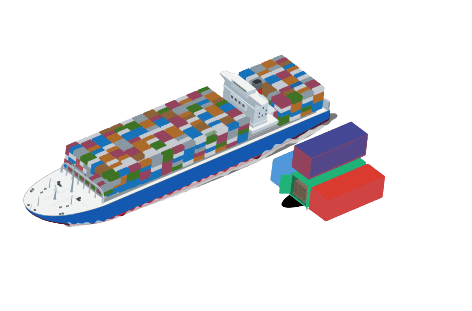For those working in the foreign trade logistics sector, especially with maritime transport, meeting deadlines is crucial to ensure efficiency and avoid losses in operations. Two important concepts related to container storage and usage time are demurrage and detention. Both are characterized as fines that can increase costs and reduce companies’ profits. Let’s explore their characteristics and differences.
What is Demurrage?
According to the Institute of Tax Studies, demurrage is a fine charged to the importer when a container remains in the port for longer than specified in the contract. This fee is also regulated by Circular 2,393/1993 of the Central Bank of Brazil, and it is described as “conventional compensation in case of delay in fulfilling the obligation to load and unload goods within the agreed-upon time.”
The maximum stay at the port is calculated from the arrival date, and each additional day is charged in dollars. The fine amount varies depending on the container size. Demurrage is one of the most important clauses in agreements between shippers and carriers and has been a part of maritime transport since its early days.
A practical example: a container is received at the terminal and has 4 days to complete its operations. However, the time is exceeded, and it remains in the port for 8 days; the applied fine will be related to the extra 4 days.
This fine is charged by the port and is related to the container’s storage at the terminal.
Container Return Responsibility Agreement
The Container Return Responsibility Agreement is a document required by some carriers to release cargo in the Siscomex (Integrated Foreign Trade System) and ensure that the container is returned in the same condition as received and within the contract’s established timeframe. The agreement provides for demurrage compensation in case of container return delays and is considered subsidiary to the cargo transportation contract.
What is Detention?
According to the United Nations Conference on Trade and Development (UNCTAD), detention refers to the charge that the importer pays for using the container outside the terminal or depot beyond the agreed free time. It is essential that the container is returned without residues and at the location indicated by the carrier.
To avoid this charge, both the shipper and the carrier should keep a copy of the container return draft with all the explicit information.
Practical example: a container has 4 days of use specified in the contract, but the time is exceeded, and it is returned in 6 days; the applied fine will be related to the extra 2 days, constituting detention.
It is important to note that even when the deadline is exceeded, operations are completed normally, provided the fine is paid correctly. This prevents transportation or commercialization from being frustrated or lost.
How to Avoid Demurrage and Detention?
To avoid demurrage and detention, some practices can be adopted:
- Use of an Inland Container Depot: Request that a customs broker uses an inland container depot for storing goods, avoiding excessive time at the port.
- Utilize a Logistics Operator: Choose a logistics operator capable of performing all planned operations, ensuring process agility and organization.
- Negotiate Post-Paid Freight: Opt for post-paid freights to negotiate a better price and extended “free time” at the terminal.
- Consider Seasonality: Be aware of less intense import and export flows to avoid congestion and delays at ports.
- Use Management Software: Have better control of dates through process management software, aiding in organization and delay prevention.
- Document Archiving: Keep all documentation archived to prove the processes performed, avoiding bureaucratic problems.
In summary, understanding the differences between demurrage and detention is essential to avoid fines and ensure the smooth operation of logistics in maritime transportation, optimizing processes and reducing costs for companies involved in foreign trade.
What is Cheap2Ship?
Get to know Cheap2Ship, a technology company specialized in logistics and foreign trade. Through our advanced freight management and quoting platform, medium and large companies have experienced a significant increase in operational efficiency and a reduction in logistics costs.
Our commitment is to provide greater transparency in the costs related to current freight providers, such as shipowners, freight forwarders, and carriers. With this, our customers can make more informed and strategic decisions for their businesses.
To learn more about our innovative solutions, visit our website and follow us on social media. There, you will find relevant content about foreign trade, logistics, and supply chain. We are ready to drive your company’s success in the global market. Join us and discover how we can make a difference for your business.

